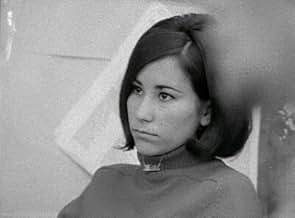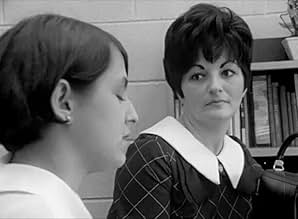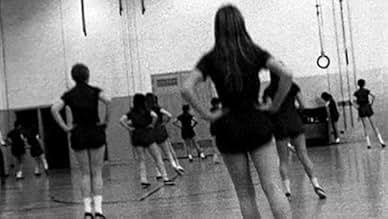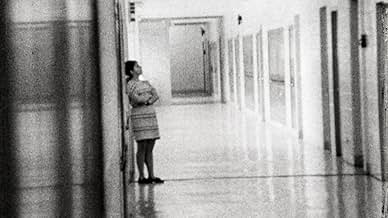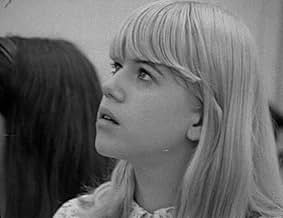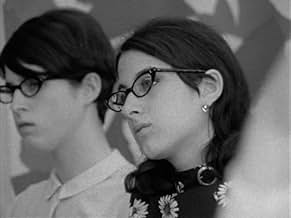AVALIAÇÃO DA IMDb
7,5/10
2,4 mil
SUA AVALIAÇÃO
Adicionar um enredo no seu idiomaDocumentary filmmaker Frederick Wiseman takes us inside Northeast High School as a fly on the wall to observe the teachers and how they interact with the students.Documentary filmmaker Frederick Wiseman takes us inside Northeast High School as a fly on the wall to observe the teachers and how they interact with the students.Documentary filmmaker Frederick Wiseman takes us inside Northeast High School as a fly on the wall to observe the teachers and how they interact with the students.
- Direção
- Prêmios
- 1 vitória no total
Avaliações em destaque
This is one of the first "cinema verite" documentaries, and it shows that even that documentary form can be opinionated. After you see this film, you'll remember exactly how high school was: oppressive. The film focuses on the idea of faculty always getting its way over students, often unfairly or underhandedly. It's interesting to note that the school faculty loved the film, even though it was meant to show them in a bad light. Artless as they obviously were, they didn't understand the implicit meaning of the film, and focused only on the obvious: that they had power over the students, and could abuse it as they pleased.
"High School" is enthralling in one sense; if you are obsessed with the mundane "American Splendor" of generations past, then you will adore this documentary. For its time, it was brilliantly avant garde and remains so even today for its muted commentary on administration and the growing disparity between older generations and the younger high schoolers of the late 60's.
There is something purely amazing in viewing such settings in this vignette as they were, undoctored by Hollywood's lens. I am fascinated by the details of a time that I will never know personally and "High School" provides a brief glimpse into the mindset of the young adults of 1969 who are not unlike ourselves.
If you dig documentaries, please give this one a shot. Maybe you'll become as obsessed with "High School" as I have.
There is something purely amazing in viewing such settings in this vignette as they were, undoctored by Hollywood's lens. I am fascinated by the details of a time that I will never know personally and "High School" provides a brief glimpse into the mindset of the young adults of 1969 who are not unlike ourselves.
If you dig documentaries, please give this one a shot. Maybe you'll become as obsessed with "High School" as I have.
Frederick Wiseman is, of course, one of the best documentary film-makers, a wonderfully evocative but not manipulative cinema verite director who has consistently been making quality documentaries for several decades. "High School" is now available from Zipporah films, albeit for a higher price than many films ($35), and it is arguably his most accessible feature.
Wiseman has directed several films that run longer than three hours, mind-numbingly intense documentaries which fiercely tear into their subject matter and are nearly completely thematically ambiguous, but "High School" is more a straightforward documentary, reminiscent in places of the sort of film the Maysles Brothers made, and of "Titicut Follies", perhaps the only other Wiseman film with a definitive approach to the subject matter. The film doesn't feature the sort of objectivity some of Wiseman's other films do, and even the sequel to this feature, "High School II", which looked at a 90's high school, is far more ambiguous and much longer than this lean 75-minute feature, but around as good.
Still, the film is not marred by simplistic messages and a preachy attitude. Wiseman's films, as they normally do, allow a remarkably candid, voyeuristic experience for the audience, letting us see some of the social attitudes of the era as well as capturing the timeless feel of the high school experience. In what is perhaps the film's greatest scene a teacher formally recites "The Dangling Conversation" by Simon and Garfunkel, then plays the song for the class. You see small mannerisms change, the teacher suddenly has a hopeful look in her eyes rather than one of a tired educator, and Wiseman brilliantly captures the class's reaction without the scene ever feeling contrived or forced. It's just the sort of scene that Wiseman does perfectly, asking the audience to interpret the images for themselves, never overstepping his boundaries and preaching to the audience.
"High School" is almost certainly Wiseman's most accessible film. At 75 minutes in length it goes by quite fast and although it isn't necessarily designed as entertainment it is more or less easy to watch except for those who had traumatic high school experiences. "High School II" is a more complex and ambitious film (and, of course, seen by far fewer people), but "High School" might have the edge in terms of just how effective and lean it is. It's a perfectly-structured documentary with a stunning final scene, and may be one of my favorite films.
10/10
Wiseman has directed several films that run longer than three hours, mind-numbingly intense documentaries which fiercely tear into their subject matter and are nearly completely thematically ambiguous, but "High School" is more a straightforward documentary, reminiscent in places of the sort of film the Maysles Brothers made, and of "Titicut Follies", perhaps the only other Wiseman film with a definitive approach to the subject matter. The film doesn't feature the sort of objectivity some of Wiseman's other films do, and even the sequel to this feature, "High School II", which looked at a 90's high school, is far more ambiguous and much longer than this lean 75-minute feature, but around as good.
Still, the film is not marred by simplistic messages and a preachy attitude. Wiseman's films, as they normally do, allow a remarkably candid, voyeuristic experience for the audience, letting us see some of the social attitudes of the era as well as capturing the timeless feel of the high school experience. In what is perhaps the film's greatest scene a teacher formally recites "The Dangling Conversation" by Simon and Garfunkel, then plays the song for the class. You see small mannerisms change, the teacher suddenly has a hopeful look in her eyes rather than one of a tired educator, and Wiseman brilliantly captures the class's reaction without the scene ever feeling contrived or forced. It's just the sort of scene that Wiseman does perfectly, asking the audience to interpret the images for themselves, never overstepping his boundaries and preaching to the audience.
"High School" is almost certainly Wiseman's most accessible film. At 75 minutes in length it goes by quite fast and although it isn't necessarily designed as entertainment it is more or less easy to watch except for those who had traumatic high school experiences. "High School II" is a more complex and ambitious film (and, of course, seen by far fewer people), but "High School" might have the edge in terms of just how effective and lean it is. It's a perfectly-structured documentary with a stunning final scene, and may be one of my favorite films.
10/10
I attended Northeast High School shortly after the movie was filmed. It is a disturbingly accurate presentation. Mr. Wiseman's cinema verite approach has encapsulated that time and space in the way to which historical endeavors aspire, but rarely achieve. The black and white format, while most likely driven by technology and cost, perfectly underscores the bland, but far from sterile, environment. While no accounting, regardless of volume, objectivity or technical accuracy, can fully convey an experience, this film merits its standing as an excellent historical work.
I remember the staff and how they made me feel. From comments I have read here and elsewhere, the movie provides the right mix of raw material for the audience to experience what I did. Or, if they "just don't get it," like the staff at the school, they will see what the staff did when the movie was made. Only after viewers expressed what they saw did the cast become incensed with what they later recalled as deceptive, malicious, slanderous abuses of trust. One teacher remarked to my class that the cameras were equipped with secret mirrors, so they could surreptitiously capture other than what they appeared to be filming. The movie was banned from Philadelphia for a number of years. This was during the Cold War. I remember wondering if people in the Soviet Union were allowed to watch it, and if I would be arrested should I smuggle it into the city.
With pathetically few exceptions, the teachers and administrators were generally condescending, arbitrarily authoritative, and guided by their own biases. They cared little for the students as learners or human beings, were poorly qualified to communicate, let alone teach, and were surprisingly more ignorant of current events than most of the students.
There was one notable exception, and I wish Mr. Wiseman could have found a way to weave it into the film's cloth without betraying its honesty.
The dean of students, figuring prominently in the movie, known as "The Mean Dean" in my day, taught my 12th grade history class. I was fortunate not to have known him in the more familiar context. At least that's what my memory tells me. With his Frank Rizzo haircut, overwhelming physical presence, brutal manner of speech, and distinctive gait owing to severe WW2 injuries, he contrasted with all of the other social sciences teachers in every way.
At the start of the school year, he explained that his â?odeanâ? alter ego would never enter the classroom and he held to that. He was honest about his opinions, never declining a straight question. He admitted what he didn't know or understand, and welcomed input from the class. He proudly related how the GI Bill allowed him to make a good life after his horrible experience in the war, his Corvette indulgence that was not popular with staff, and an almost childlike fascination with the complexity of the world. His unambiguous goal was to encourage the students to be skeptical of news and politics, to collect information from many sources, and to analyze and draw their own conclusions. It was one of the only classes in which we were taught to think for ourselves. The only textbook was a mandatory subscription to the Sunday New York Times, which we were required to read. Class assignments consisted of our comments and analyses of articles and editorials. Grading was based entirely on quality of the analysis. He was excruciatingly critical of process, and completely oblivious to content. I donâ?Tt know how he felt about the late Justice, but for me William Brennan and my 12th grade history teacher are my two First Amendment icons. I agreed with almost none of his very clearly expressed opinions. Still, I remember this as the most liberal of any class in my public school education.
There was one other notable exception to the gray abyss of high school. The SPARC extracurricular program, and its associated magnet program curriculum for the tiny clique of "advanced placement" students, was one bright spot in the school district's otherwise unenviable history. But it was so academically and physically isolated from the school mainstream, I don't see how it could have been accurately integrated into this movie. The shame is that the excellent teachers and equipment afforded by the program were not available to the large majority of students.
The reading of the soldier's letter was a perfect closing, as it so perfectly distilled the utter ignorance of that generation of teachers and administrators. There has been some progress in the intervening 30+ years, but there has also been some backsliding. "High School" remains, sadly, a timely insight into the education system in this country.
I remember the staff and how they made me feel. From comments I have read here and elsewhere, the movie provides the right mix of raw material for the audience to experience what I did. Or, if they "just don't get it," like the staff at the school, they will see what the staff did when the movie was made. Only after viewers expressed what they saw did the cast become incensed with what they later recalled as deceptive, malicious, slanderous abuses of trust. One teacher remarked to my class that the cameras were equipped with secret mirrors, so they could surreptitiously capture other than what they appeared to be filming. The movie was banned from Philadelphia for a number of years. This was during the Cold War. I remember wondering if people in the Soviet Union were allowed to watch it, and if I would be arrested should I smuggle it into the city.
With pathetically few exceptions, the teachers and administrators were generally condescending, arbitrarily authoritative, and guided by their own biases. They cared little for the students as learners or human beings, were poorly qualified to communicate, let alone teach, and were surprisingly more ignorant of current events than most of the students.
There was one notable exception, and I wish Mr. Wiseman could have found a way to weave it into the film's cloth without betraying its honesty.
The dean of students, figuring prominently in the movie, known as "The Mean Dean" in my day, taught my 12th grade history class. I was fortunate not to have known him in the more familiar context. At least that's what my memory tells me. With his Frank Rizzo haircut, overwhelming physical presence, brutal manner of speech, and distinctive gait owing to severe WW2 injuries, he contrasted with all of the other social sciences teachers in every way.
At the start of the school year, he explained that his â?odeanâ? alter ego would never enter the classroom and he held to that. He was honest about his opinions, never declining a straight question. He admitted what he didn't know or understand, and welcomed input from the class. He proudly related how the GI Bill allowed him to make a good life after his horrible experience in the war, his Corvette indulgence that was not popular with staff, and an almost childlike fascination with the complexity of the world. His unambiguous goal was to encourage the students to be skeptical of news and politics, to collect information from many sources, and to analyze and draw their own conclusions. It was one of the only classes in which we were taught to think for ourselves. The only textbook was a mandatory subscription to the Sunday New York Times, which we were required to read. Class assignments consisted of our comments and analyses of articles and editorials. Grading was based entirely on quality of the analysis. He was excruciatingly critical of process, and completely oblivious to content. I donâ?Tt know how he felt about the late Justice, but for me William Brennan and my 12th grade history teacher are my two First Amendment icons. I agreed with almost none of his very clearly expressed opinions. Still, I remember this as the most liberal of any class in my public school education.
There was one other notable exception to the gray abyss of high school. The SPARC extracurricular program, and its associated magnet program curriculum for the tiny clique of "advanced placement" students, was one bright spot in the school district's otherwise unenviable history. But it was so academically and physically isolated from the school mainstream, I don't see how it could have been accurately integrated into this movie. The shame is that the excellent teachers and equipment afforded by the program were not available to the large majority of students.
The reading of the soldier's letter was a perfect closing, as it so perfectly distilled the utter ignorance of that generation of teachers and administrators. There has been some progress in the intervening 30+ years, but there has also been some backsliding. "High School" remains, sadly, a timely insight into the education system in this country.
As in TITICUT FOLLIES, Wiseman takes his camera inside an institution and exposes the authoritarianism that dominates the place. However, I have to say I was less disturbed by what I saw here. There are some clear instances of backwards attitudes: the notably different tones of the female and male sex ed lectures, what is apparently a fashion class where the teacher casually remarks of the students' physical shortcomings, and the chillingly obtuse reading of a letter from a student serving in Vietnam. But other clips that seemed designed to point out some sort of injustice or dehumanization didn't strike me as terribly egregious. Are we supposed to judge the English teacher as ridiculous for attempting to teach poetry with a Simon & Garfunkel song? When a kid says he doesn't deserve detention, are you just supposed to say "Oh, sorry about that" and let them skip it? Maybe some of the figures are a little out of touch and some are a little bit drunk on power, but I really didn't see a whole lot to make me think the school was a fascist nightmare or anything. Still, perhaps the attitudes speak louder than the actual actions, and there is a sense of isolation from the real world. And regardless of whatever messages Wiseman is trying to get across, it's a compelling look at a specific time and place.
Você sabia?
- CuriosidadesThis film was selected to the National Film Registry, Library of Congress, in 1991.
- Citações
Male Authority Figure: It's nice to be individualistic, but there are certain places to be individualistic.
Female Student: I didn't mean to be individualistic.
Male Authority Figure: No, I'm not criticizing!
- ConexõesFollowed by High School II (1994)
- Trilhas sonoras(Sittin' On) The Dock of the Bay
(uncredited)
Written by Steve Cropper and Otis Redding
Performed by Otis Redding
Principais escolhas
Faça login para avaliar e ver a lista de recomendações personalizadas
- How long is High School?Fornecido pela Alexa
Detalhes
- Tempo de duração
- 1 h 15 min(75 min)
- Cor
- Mixagem de som
Contribua para esta página
Sugerir uma alteração ou adicionar conteúdo ausente

